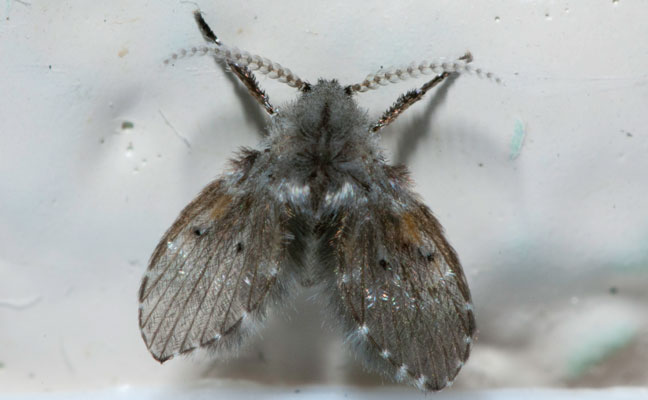Editor’s Note: The following insights are in addition to what the author writes in our June issue’s “Ask the Expert” column on identifying and treating small fly species problems at commercial accounts.

Psychoda alternata is commonly known as the trickling filter fly or drain fly. PHOTO: COURTESY OF, AND COPYRIGHTED BY, GENE WHITE, PMIMAGES@EARTHLINK.NET.
Drain flies (Psychodidae): Inspect drains, of course, and anywhere water and organic material collects and goes largely undisturbed. Look for drains that are clogged or have not been properly cleaned. While clogged drains require a plumber, pest management professionals can clean and treat drains with the right equipment and properly labeled materials. Cracked tile and missing grout — among other areas — can be culprits, too, so look everywhere that moisture and organic material can collect and decay.
Fruit flies (Drosophilidae): Inspect fruits, of course, but don’t forget the onions. Also check out trash cans, catch basins, damp rags — anywhere there is water/moisture and organic material collected. Soda dispensers, including catch pans and drains, can be sources, too.
Fungus gnats (Sciaridae): Inspect areas of fungus, of course (it’s almost as though the common names tell us something), as well as water and mold. Usually these are associated with overwatered plants, but like the other small flies, alternative sources exist.
Phorid flies (Phoridae): OK, the naming convention falls apart here, but inspect anywhere there is decaying organic material and water.
The common theme with flies is there will be water and some sort of organic material collecting somewhere and not being cleaned up. Warmth is a factor, but indoor spaces usually are warm enough to support fly development.
Email your questions about insect identification and pest management technologies to pmpeditor@northcoastmedia.net. Your questions most likely will be printed and answered in one of Pest Management Professional’s upcoming columns.
BALDWIN is director of technical, training and regulatory services for Terminix Commercial. He may be reached at dbaldwin@terminix.com.
Leave A Comment